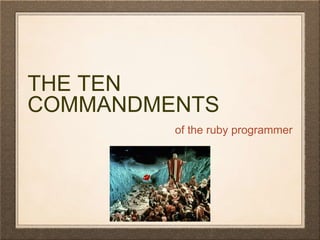Rubyconf2014
- 1. THE TEN COMMANDMENTS of the ruby programmer
- 2. I AM EMILIO A RUBY PROGRAMMER Software developer +15 yrs 10Pines founder Agiles community founding member agiles 2012 conference co-chair husband, father and homeBrewer
- 3. I. Thou shalt have no domain objects coupled with thy frameworks
- 4. class Speaker < ActiveRecord::Base ! devise :omniauthable, :omniauth_providers => [:facebook] ! def approve_session(session) # do something SessionMailer.approve(speaker: self, session: session).deliver end ! end
- 5. II. THOU SHALT NOT STEAL & PASTE CODE
- 6. public List selectPending(List registrations) { ! List pending = new ArrayList(); for (Registration registration: registrations) { if (!registration.isPaid()) { pending.add(registration); } } return pending; }
- 7. ! def select_pending(registrations) registrations.reject(&:paid?) end ! !
- 8. class SessionsController < ApplicationController ! def create ! @session = Session.new(session_params) ! if @session.save redirect_to my_sessions_path, notice: 'Session created successfully' else render :new end ! end end
- 9. class Program ! def find_by_author(author) ! sessions = Session.where(author: author, approved: true) ! if sessions.empty? # do something else # do something end end ! end
- 10. III. THOU SHALT NOT USE NIL
- 11. class AttendeePresenter ! def phone_number ! unless self.address.nil? unless self.address.phone_number.nil? self.address.phone_number else 'Phone number not present' end else 'Address not present' end end ! end
- 12. class Attendee def initialize(address) if address.nil? raise ArgumentError, 'Address is required' end @address = address end ! def address @address || UnknownAddress.new end ! def phone_number Optional.new(@address). within {|address| address.phone_number} end end
- 13. IV. THOU SHALT NOT USE IF
- 14. class BankAccount ! def process a_transaction ! if a_transaction.type == :purchase # charge transaction fee else # assume refund end end ! end
- 15. class BankAccount ! def process a_transaction a_transaction.process self end ! def process_purchase a_transaction # charge transaction fee end ! def process_refund a_transaction # refund transaction fee end ! end
- 16. class Purchase < Transaction ! def process a_payment_method a_payment_method.process_purchase self end end ! class Refund < Transaction ! def process a_payment_method a_payment_method.process_refund self end end
- 17. V. THOU SHALT NOT MOCK
- 18. require 'spec_helper' ! describe Registration do ! it 'pays a registration' do ! attendee_id = 1 a_registration = double("Registration") an_attendee = double("Attendee", registration: a_registration) ! allow(Attendee).to receive(:find) { an_attendee } ! expect(a_registration).to receive(:paid=).with(true) expect(a_registration).to receive(:save).and_return(true) ! expect_any_instance_of(PaypalAccount).to receive(:process) ! Registration.pay(attendee_id) ! end end
- 19. VI. THOU SHALT NOT TAKE THY TESTS IN VAIN
- 20. VI. THOU SHALT NOT TAKE THY IN VAIN VII. REMEMBER TO REFACTOR EVERY DAY
- 21. VI. THOU SHALT NOT TAKE THY IN VAIN VII. REMEMBER TO REFACTOR VII. THOU SHALT BEAR YOUR FELLOW PROGRAMMERS AND PAIR WITH THEM
- 22. IX. CHALLENGE HONOUR /[RUBY|RAILS|.*]/ FATHER AND MOTHER
- 23. X. NO GRAVEN PRACTICES
- 24. QUESTIONS? comments, critics, compliments
- 25. THANKS!!! email: egutter@10pines.com twitter: @10pines site: dev.10pines.com blog: blog.10pines.com



![class Speaker < ActiveRecord::Base
!
devise :omniauthable,
:omniauth_providers => [:facebook]
!
def approve_session(session)
# do something
SessionMailer.approve(speaker: self,
session: session).deliver
end
!
end](https://image.slidesharecdn.com/rubyconf2014-141026101139-conversion-gate01/85/Rubyconf2014-4-320.jpg)

















![IX. CHALLENGE
HONOUR
/[RUBY|RAILS|.*]/
FATHER AND MOTHER](https://image.slidesharecdn.com/rubyconf2014-141026101139-conversion-gate01/85/Rubyconf2014-22-320.jpg)


